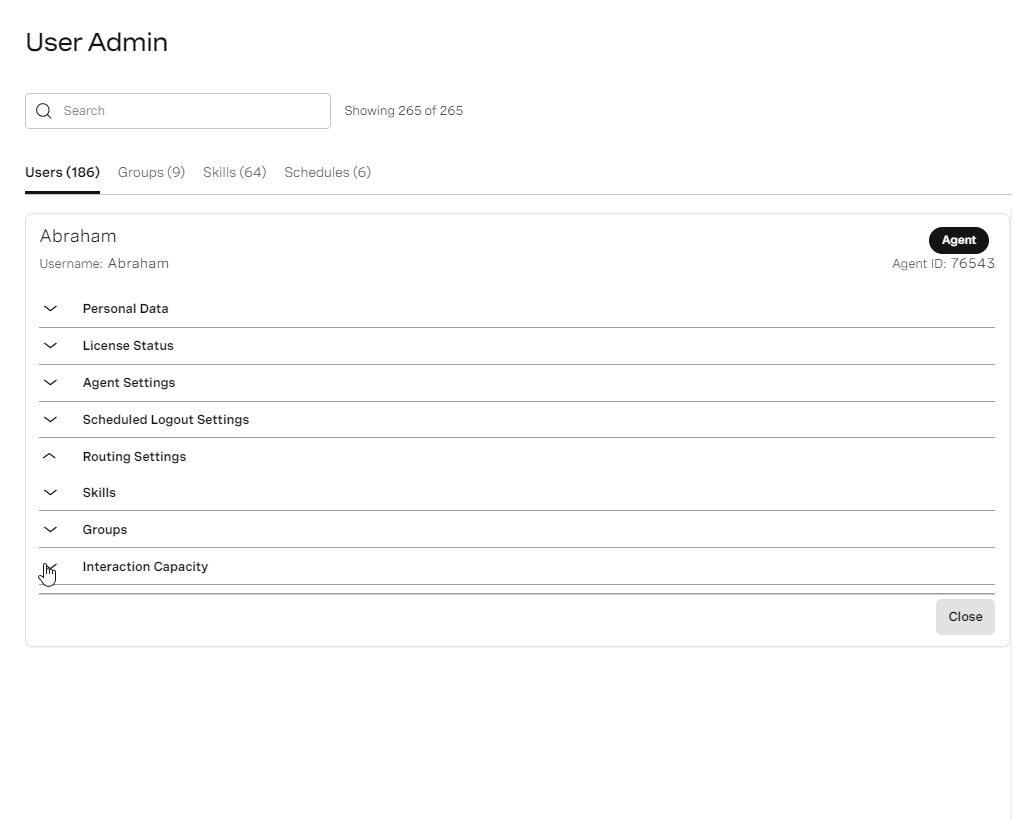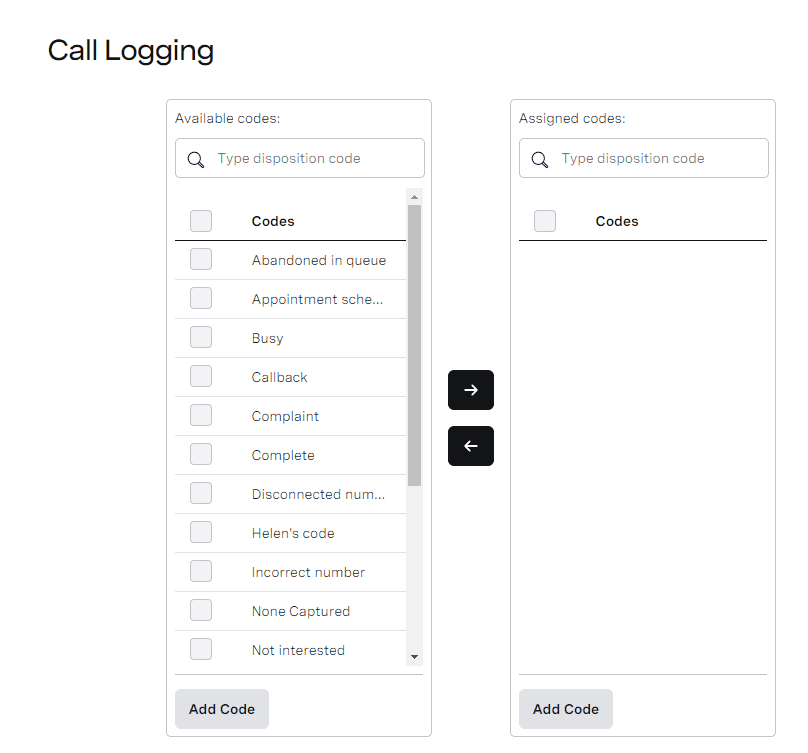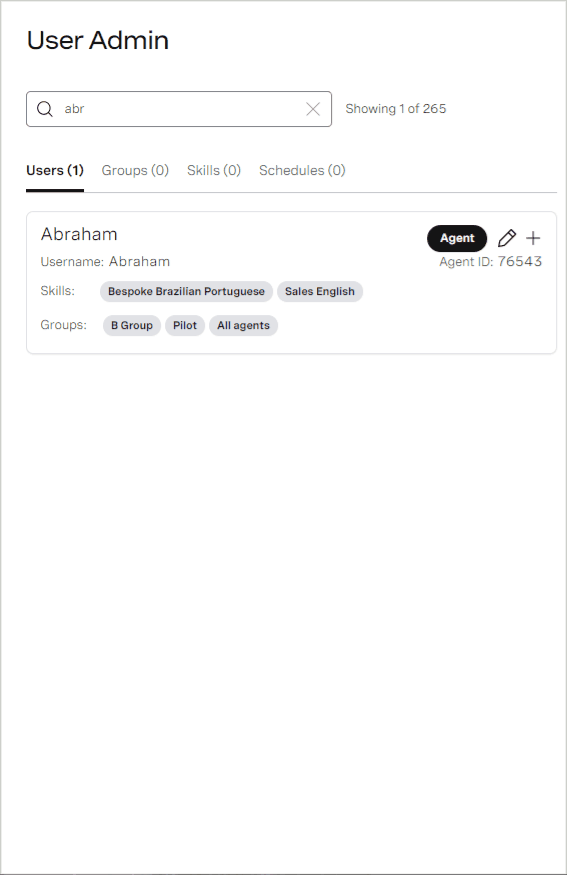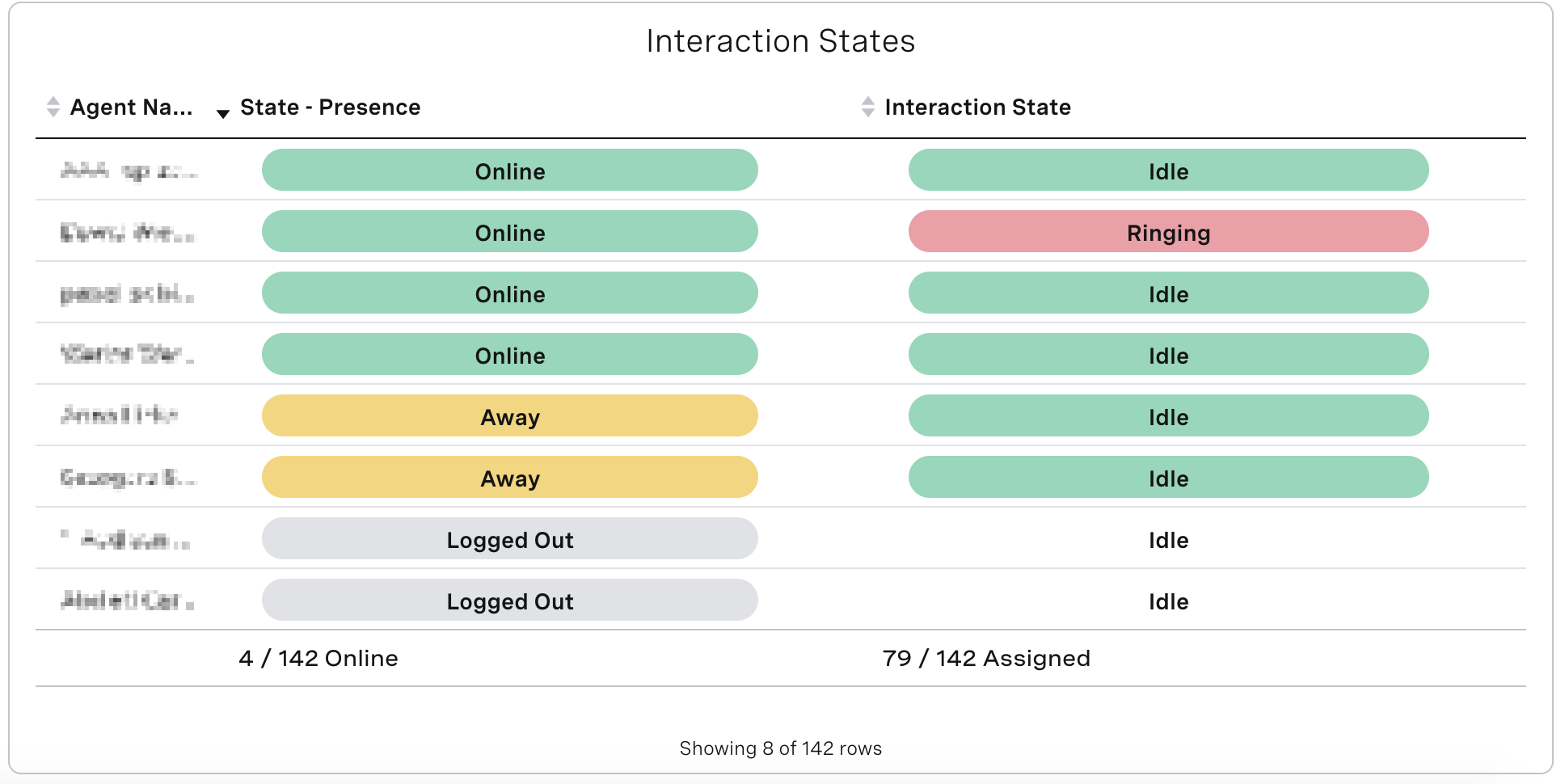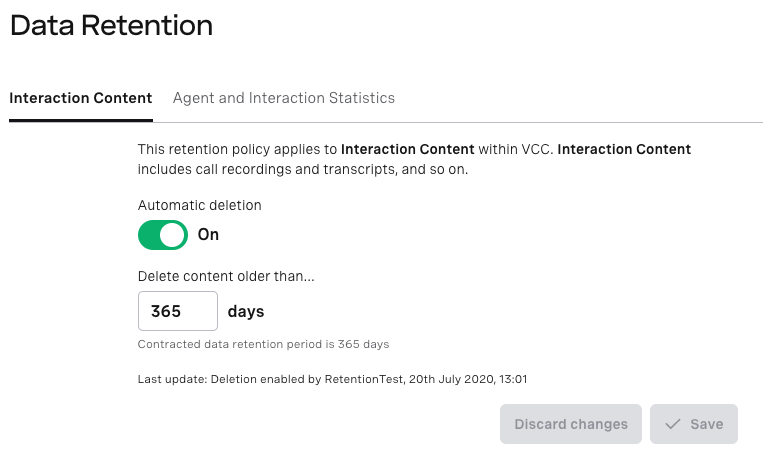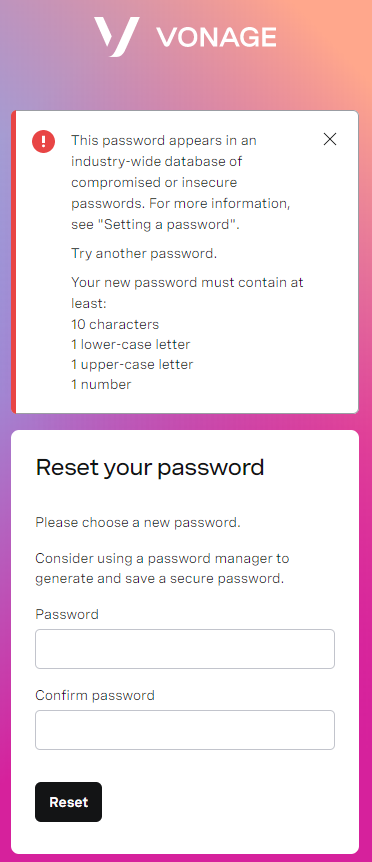Summer '20 release
In this page |
|---|
General Availability Features
Omnichannel
In Summer ‘20, Vonage’s integration with Salesforce external routing moved into limited availability. When integrated and configured, VCC manages the routing for interactions for all of your channels; administrators can configure routing logic for all interactions in VCC Admin Portal. User experience and reporting is consistent across all channels.
Limited availability means that a limited number of customers will be enabled. If you are interested in this feature, contact your account manager or customer success manager. As demand increases, we will enable the feature for all of our customers.
Live chat
Since Summer ‘20, Vonage integrates with Salesforce external routing. This means that you are now able to add chat routing to your contact center.
During the pilot program for chat routing, the following features were identified to fit the needs of our customers. All these features were delivered in our Summer ‘20 release:
Agent capacity configuration
Different agents can effectively handle different numbers and types of interactions simultaneously. What might be suitable for one agent may be frustratingly too much or frustratingly too little for another. Previously, you could only configure capacity settings for your account; the settings applied to all agents in your contact center account.
Since Summer '20, you can configure different capacities for individual agents.
For information about configuring agent capacity, see How do I set interaction capacity for an agent user? in Configuring individual users.
Voice capacity configuration
Previously, administrators could configure capacity—the number of interactions agents can handle at the same time—for semi- and non-live interactions.
Since Summer '20, if enabled, administrators can configure capacity for live interactions—for example, calls—from 51% to 100%. If the capacity of a live interaction is less than 100%, VCC can potentially route a call to an agent who is busy on another type of interaction. Conversely, VCC can potentially route an email to an agent who is handling a call.
For information about configuring voice capacity, see Interaction Capacity Settings in Editing Configuration (Account Settings).
Optimal load routing
The optimal load feature enables administrators to set agents' ideal capacity. An agent’s optimal load is the capacity that their assigned interactions should ideally consume to ensure the agent is best utilized. With optimal load, VCC will route semi- or non-live interactions to agents who are already working on such interactions, up to their optimal load. Agents who are idle therefore have enough capacity to handle live interactions which require at least 51% agent capacity. VCC will avoid routing interactions to agents whose assigned interactions consume more than their optimal load.
For information about configuring optimal load rating, see Configuring optimum load settings for multi-interaction routing in Configuring multi-interaction routing.
Omnichannel in ContactPad
From the Summer ‘20 release onwards, additional controls for handling multiple interactions—calls, chats, or emails—appear in ContactPad. When the agent clicks the interaction in ContactPad’s information panel, the associated Salesforce record comes into focus or pop—if the record is already open it comes into focus; if it is not, it pops.
When a chat is routed to an agent, the agent’s state changes to an alerting state. This preserves the capacity for the chat before the agent accepts or declines the chat.
Interactions appear in ContactPad individually and their details are available from the Insights Stats API and in Dashboards.
This feature, along with the multi-interaction ContactPad, is supported for all our omnichannel customers, whether you are using Unite to route cases, Salesforce to route non-call interactions and for presence synchronization, Salesforce External Routing to route Salesforce interactions to VCC which completes the routing, or our Interactions API in which you develop your own omnichannel integration with our platform.
For information about using omnichannel in ContactPad, see Using multi-interaction routing.
End chat (Lightning)
Previously, if an agent closed a live chat using the End Chat button in Salesforce Lightning Experience, the chat was not released in ContactPad. Since Summer '20, agents can release chats in the way that suits them best—from ContactPad or from Salesforce.
Agent experience
Disposition codes setting and reporting
Disposition codes are attributes applied to contact center interactions—calls, emails, web chats, and so on— either during the interaction or at the end. Your Vonage Contact Center account can have one of the following disposition code configurations:
None. Disposition codes are not required and agents do not need to provide a code to proceed to their next interaction.
Requested. VCC requests that agents provide disposition codes for their interactions. Agents can proceed to their next interactions even if they do not provide disposition codes.
Forced. Agent must provide disposition codes for their interactions. VCC does not allow agents to proceed to their next interactions until they provide disposition codes.
VCC administrators can turn the disposition codes feature on and off for their accounts. When enabled, administrators can import a predefined list of available codes. The administrator can also create and modify codes for their accounts as required.
When configured, agents can select disposition codes during and after their interactions in ContactPad. Administrators and supervisors can monitor and report on disposition codes in Dashboards.
For information about setting and reporting on disposition codes, see Interaction Logging, Logging an interaction in ContactPad, and Viewing disposition codes in Real-time Analytics.
Post call quality rating
In Spring ‘20, the Report audio problems feature was released. Report audio problems gives VCC operations and support staff early visibility of developing problems. However, because this feature only reports problems it gives a distorted view of VCC call quality.
Since Summer '20, Post call quality rating complements existing problem reporting. The feature enables agents to provide a single overall rating (good or bad) at the end of a call. Agents provide a number which maps to an opinion score (a whole number between 1 and 5). These opinion scores are averaged into Mean Opinion Scores (MOS)—a number between 1.0 and 5.0. MOS are calculated for an interaction (as multiple VCC users can be engaged on a call), a location, an entire VCC account, and so on.
The opinion scores and MOS are available in Dashboards and Statistics alongside the data from Report audio problems and together this provides VCC customers and VCC staff with a holistic view of VCC call quality.
For information about post call quality rating, see Post Call Quality Rating in ContactPad.
Routing
Skill levels
Previously, in User Admin, admin users could assign skills to agents. Agents either have a skill or not. When an interaction that requires a specified skill arrives in VCC, VCC routes that interaction to any agent with that skill. VCC might have assigned the interaction to an agent with limited knowledge or experience in the skill, or to an agent who is an expert.
Since Summer '20 and if enabled for your account, an admin user can assign a skill to an agent at a level from 1 through 10. A level of 1 indicates a low skill level, while 10 is the highest level of skill an agent can have. VCC assigns an interaction to the most appropriate available agent, based on the interaction’s mandatory and optional skills and skills levels of available agents. Admin users can use the Routing Simulator to work out the best configuration for their business needs.
For information about skill levels, see How do I define the proficiency of an agent user in a skill? in Configuring individual users and How do I assign a skill to a user? in Configuring skills.
Group overflow
Previously, all agents within groups configured in an Automatic Call Distributor (ACD) applet in skills based mode—or a Universal Contact Distributor (UCD)—were considered for routing.
Since Summer '20, an ACD applet in skills based mode supports group overflow. With group overflow, VCC tries to assign interactions to agents in each group in turn, only trying the next group after the specified overflow time.
For information about group overflow, see Group Settings in Automatic Call Distributor (ACD) or Universal Contact Distributor (UCD) applet.
Announce place in queue
From the Summer '20 release onwards, an Automatic Call Distributor (ACD) applet in skills-based mode can optionally announce a caller's place in the queue.
For information about announcing a caller’s place in the queue, see Queue Settings in Automatic Call Distributor (ACD) or Universal Contact Distributor (UCD) applet.
ContactPad queue management (skills based routing)
The number of interactions queuing in ContactPad previously included interactions that an agent had the skills to take immediately. An agent who became eligible to handle an interaction after a specified period of time (due to a skill expiring or group overflow) did not see the change reflected in ContactPad.
From Summer '20, the number of interactions queuing in ContactPad increases as interactions are considered eligible for an agent. This helps agents to self-manage in an increasingly isolated environment.
Improve queue experience
In the Summer ‘20 release, we made some significant improvements in skills-based routing. Previously, even if an agent was available to answer an inbound call, callers may have heard music or announcements for a very short time before being connected to the agent. Our recent improvements mean that we determine whether an agent is available before the call enters the queue. If an agent is available, we can connect the caller to that agent before playing any music or announcements.
Dynamic menu enablement
As part of the Summer '20 release, a new field, Enable Barge-in, was made available in the Data Announcer applet. If barge-in is enabled, callers can press any key on their telephone keypad to skip the remainder of this announcement and any following announcements. The key that the caller presses is logged and used by the first subsequent applet that uses or collects keypad tones, a Menu Tone applet for example.
Enable Barge-in facilitates the creation of a dynamic menu, using a string of Data Announcer applets leading into other applets. Such applets route interactions according to the key or keys pressed by associated callers.
For information about barge-in, see Announcer applet.
PCI
Self-service secure payments
The Summer '20 release included the self-service secure payments feature. This feature enables agents to take secure payments through interactive voice response (IVR). Using IVR, customers can pay for goods and services without interacting with an agent. Instead of speaking to an agent, VCC transfers the caller to an automated payment system. The automated payment system collects and verifies card details from caller. The payment system processes the payment request and then routes the call back to VCC.
For information about self-service secure payments, see IVR Secure Payments solution.
Dashboards
Dashboards provide interactive displays that provide insights into a VCC account's activity. Dashboards are made up of various visual components known as widgets that represent past and current activity. Widgets display VCC metrics, optionally filtered (by timeframe, queue, media type, and so on), in the chosen visualization style (gauge, donut, and so on). The built-in threshold capability enables users to draw attention to changes in account performance.
Dashboards were previously available to a proportion of our customers, giving us feedback to improve the visibility they provide. Since Summer '20 Dashboards have been generally available, and are default on for all accounts.
The Summer '20 release also included the following improvements for existing users:
Interaction states are colored to help show when an agent is available to take a new interaction
Presence and interaction state colors match ContactPad state colors to improve consistency
Agent dashboards
Previously, dashboards were most commonly used by account supervisors or on a shared wallboard, but more recently contact center users have become remote. In recognition of this change, the Summer '20 release included read-only agent dashboards.
The feature enables the owner of a public dashboard to share the direct URL with agents. Those agents can then access a read-only version of the dashboard, providing them the insights they need to make informed decisions throughout the day.
This feature is available for all customers; admin users can enable the feature within the VCC Admin Portal.
For information about agent dashboards, see Viewing a Real-time Analytics dashboard as an agent.
Administration
Configurable data retention
Since Summer '20, the Data Retention area has been available in VCC Admin Portal. The Data Retention area contains retention settings. These settings apply to interaction content such as call recordings, audio transcripts, and so on, and agent and interaction statistics. Retention settings determine the frequency with which such data is automatically deleted from an account. Users with an admin license can change these settings.
To give you full visibility of the data retention settings for your account, we paused automatic deletion of content for all accounts in the Summer release. Admin users in your account will be prompted when they log in to review and update data retention settings for both interaction content, and agent and interaction statistics. When reviewed and updated, automatic deletion will be resumed. To avoid keeping data longer than required, you must review and update settings as soon as possible after the release.
For information about data retention, see Data Retention.
Enhanced password security
Security of your data is of utmost importance to Vonage. For that reason we have taken steps to further enhance our password security with Vonage Contact Center.
In the Summer '20 release, we removed the ability to configure PIN logins for agents. All agents previously using PINs have to set a new password meeting the password strength settings configured within your account.
In addition to this change, we further enhanced password security by checking active and new passwords against a database of more than half a billion passwords. These passwords have been previously exposed in data breaches or are insecure. When an agent logs in or changes their password, if their current or new password is compromised or insecure, the agent must change their password.
For information about enhanced password security, see Passwords in Vonage Contact Center.
Simplified email notifications
With VCC you can configure the platform to send email notifications. By default, VCC can send emails such as welcome emails to new users, and email address and password reset emails.
Depending on your account’s configuration, VCC might also send emails from the following applets:
IVR Send Questionnaire applet
Send E-mail applet
Take Message applet
VoiceMail applet
From 5th October 2020, VCC will send all emails from noreply@cc.vonage.com. Admin users will no longer be able to configure custom ‘from’ addresses.
No changes are required within the VCC platform itself, but admin users may need to update their own custom configuration on the receiver side. Possible changes are:
Update email rules that use ‘from’ address to use ‘subject’ instead
Add noreply@cc.vonage.com to email allowlists, and remove from blocklists
Update any automation based on the ‘from’ address to use ‘subject’ instead
Update From Address for any scheduled reports sent from Stats & Reports
Interaction Content Search
From Summer '20 onward, the Interaction Content Search area has replaced Call Recordings in the VCC Admin Portal. Using Interaction Content Search, users can to search for interactions and their associated audio recordings, and, if Conversation Analyzer is enabled for their account, analysis of the recording. Users can search for and filter content by date, agent ID, call direction, and so on.
For information about Interaction Content Search, see Interaction Content.
Interaction Content API
The Interaction Content API enables VCC users to search for interactions with content such as call recordings, transcripts, categorization results, and screen recordings (pilot). Users can then download that content. The API replaces our SFTP offering for downloading call recordings. Our SFTP capability is being deprecated. All existing SFTP customers will be given access to the API and are encouraged to migrate.
For information about using the Interaction Content API, see Interaction Content API.
Call recording
Auto pause/resume recordings during consults, conferences, and transfers
Previously, when an agent consults with an external third-party while on a call, if the call is being recorded, the recording continues. The agent must manually pause the recording if required. Relying on the agent to manually pause the call or explicitly get the third-party’s consent to be recorded every time is risky.
Since Summer '20 onwards, if enabled, when an agent consults with an external third-party, VCC automatically pauses recording the call. When agent ends the consult, VCC automatically resumes the recording. The same applies to conferences that include an external party and transfers to an external party.
For information about pausing and resuming recordings during consults, conferences, and transfers, see Automatic pause and resume recording in Call recording.
One-sided call recording using the VCC API
Currently, what VCC records—both sides, agent only—is configured for an account by Vonage.
Since the Summer '20 release, when initiating calls using our API, users can choose what to record—both sides, agent only, or nothing—for each outbound call. This capability is especially useful when strict rules about what can be recorded without prior agreement exist.
For information about configuring your Salesforce integration to use consent-based call recording, see Configuring one-sided call recording.
Microsoft Integration
Microsoft Teams direct routing for agent connect
Vonage Agent Connect routes calls from VCC to customer equipment (for example, PBX or UC platforms installed on premises or in the cloud) over the Internet or using a dedicated link through MPLS. Direct routing calls from Vonage Contact Center improves call quality and reliability by bypassing the PSTN.
Customers who use VCC and Teams can now use Microsoft Teams Direct Routing with Vonage Agent Connect to efficiently route calls from VCC into Teams. Direct Routing for Agent Connect can be combined with our existing Microsoft 365 Single-Sign-On (SSO) capability to provide users of VCC and Teams with a great integrated experience.
Vonage AI
Virtual Assistant
Virtual Assistant delivers conversational artificial intelligence (AI) for business communication within your Vonage solution. Virtual Assistant uses AI to deliver enhanced self-service interactions using natural language and enable additional capacity within your contact center.
Virtual Assistant interprets what the customer’s question is and, if required, asks clarifying questions to formulate the appropriate response. That response may be referencing content from an FAQ, proposing an action to update or read customer data, or routing the call to the correct queue within Interaction Architect.
Adding this service may incur professional services time and additional product charges.
Important announcements
EMEA Infrastructure Refresh
As part of our continued technology life cycle in order to provide our customers with a stable, secure, and scalable service, over the coming months Vonage will be updating and refreshing our infrastructure within the EMEA region. We expect this to have no impact on the vast majority of customers; those with bespoke configurations will be contacted to manage any impact on a case by case basis.
These changes will introduce new public IP addresses. EMEA customers that make use of an allowlist (formally known as whitelist) will need to update their allowed IPs as detailed in the Technical prerequisites before 1st Oct 2020.
Reminders
Vonage Contact Center WebRTC
In the first half of 2020, we began rolling out updates to the VCC WebRTC layer. We designed the updates to be transparent to VCC WebRTC users so they should not observe any differences before, during, or after the updates. If you have strict firewalls, you need to update your allowlist of IP addresses to ensure that your users will continue connecting to the WebRTC service.
For information about the IP addresses you need to add to your allowlist, see WebRTC firewall configuration within Telephony in Technical prerequisites.
Feature Retirement
Along with the exciting new functionality added to the product with every release, we are also working to retire older parts of the product. The removal of functionality within our product is completed in up to these stages:
Intent to deprecate
This is an optional stage that gives users early warning of our intent to deprecate functionality. It is most commonly used when an alternative is announced, and gives users the ability to migrate ahead of the functionality becoming deprecated. At this stage we encourage customers to stop using the mentioned product functionality, and migrate to an alternative.
Deprecated
This indicates that a piece of functionality is no longer supported. The functionality will continue to work, but no new enhancements or bug fixes will be made (with the exception of security vulnerabilities) and new functionality may not be compatible. We commonly announced the target End of Life date when deprecating. At this stage customers must stop using the mentioned product functionality, and migrate to an alternative.
End of life
The date in which we will remove functionality is referred to as the End of Life. After this date the functionality will cease working entirely.
Agent PINs—end of life
As detailed in the Enhanced Password Security enhancement earlier in this page, support for Agent PINs is End of Life immediately following the Summer release. All agents using PINs will be prompted to change their password.
Cloud-based URLs—deprecated
As previously announced, Vonage introduced new URLs to access the Contact Center platform within each region. The regional URLs ensure that your agents and users benefit from our active-active cloud infrastructure, such that in the event of an outage, no users will be required to change their URL to access VCC and can simply log back in to resume their work. Instead of using specific cloud numbers in your URLs, we ask that you update your links and bookmarks to use the regional URL stated below. You can also find an article in the Vonage Community Hub called “How Can I Configure Salesforce for Enhanced Disaster Recovery?”.
Old URL | New URL |
|---|---|
cloud11.contact-world.net | emea.newvoicemedia.com |
cloud8.contact-world.net | |
cloud16.contact-world.net | nam.newvoicemedia.com |
cloud17.contact-world.net | |
cloud12.contact-world.net | apac.newvoicemedia.com |
cloud14.contact-world.net |
The cloud-based URLs are now formally deprecated and all users accessing VCC using these URLs will receive a warning during login.
Projected end of life: Winter ‘21 Release.
Skill Management—deprecated
As part of the release of ‘Skill Levels’ we have now provided the ability for supervisors to manage skills within the User Admin area of the platform. We will not offer the same functionality within the Skill Management area and therefore are deprecating this area of the product as of the Summer ‘20 Release.
Projected end of life: Winter ‘21 Release.
Call Recordings (search page)—deprecated
The new Interaction Content Search in Summer '20 provides an improved user experience when searching for call recordings and other interaction content. This replaces the existing Call Recordings page, that is now deprecated. All customers must migrate to using the Interaction Content Search page.
Projected End of Life: Winter ‘21 Release.
SFTP Support—intent to deprecate
Today we offer SFTP access to download Call Recordings in bulk. With the introduction of the Interaction Content API customers can gain the same access, with the added benefit of all interactions content types, rich metadata about each interaction, a simpler interface to programmatically integrate with.
This is notice of our intent to deprecate SFTP support. Users of SFTP should begin migrating from SFTP to the new API. SFTP will continue to work until its official end of life.
Projected deprecation date: First half of 2021
Microsoft Internet Explorer 11—intent to deprecate
As of 1st January 2021 Vonage intends to deprecate support for IE11. This means that future development from 1st January 2021 will not support IE11, therefore to gain advantage of the future development it is advised that customers using IE11 migrate to a supported browser. Deprecating support for IE11 doesn’t mean that the product will stop working, however there will be no bugfix support for IE11 related issues that are discovered or reported.
Read more about the supported browsers in our Technical prerequisites.
Deprecation date: 1st January 2021.
For general assistance, please contact Customer Support.
For help using this documentation, please send an email to docs_feedback@vonage.com. We're happy to hear from you. Your contribution helps everyone at Vonage! Please include the name of the page in your email.
